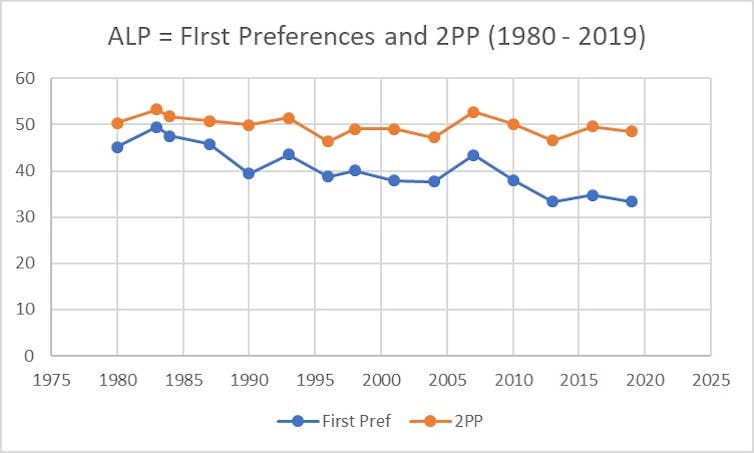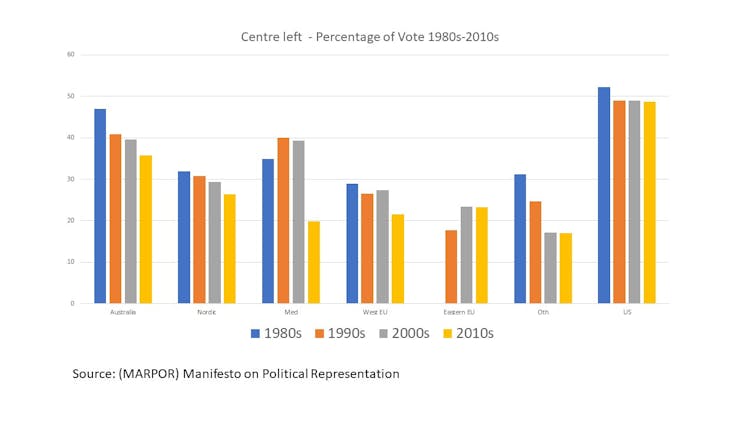Centre-left politics: dead, in crisis, or in transition?
- Written by Rob Manwaring, Senior Lecturer, Politics and Public Policy, Flinders University
The ALP’s defeat at the 2019 federal election was a surprise. Shorten’s Labor fell short, against both wider commentariat predictions and unrepresentative polls. Yet, if we take a step back, the result is less surprising if we locate Labor’s defeat in the wider “crisis” of social democracy.
Across the advanced industrial world, the centre-left largely remains in opposition, with poor prospects for immediate future government. In the UK, Corbyn-led Labour has been unable to capitalise on the Brexit result, and the chaos that enveloped Theresa May’s Conservatives. A likely “Boris bounce” (or “Hunt honeymoon”) may only make the gap wider.
In Germany, the Social Democratic Party (SPD) was once a colossus of European social democracy. But it has failed to dent Angela Merkel’s long dominance of German politics, and critically, is now being pushed even behind the German Greens as the main left challenger.
Elsewhere, the results are poor. Last year, Matteo Renzi’s centre-left coalition lost out at the Italian elections, and the extraordinary populist government of the Five Star Movement and far-right League hold office. In France, the Socialist Party (PS) has seemingly not recovered from the Macron win at the French Presidential election. The Dutch Labour Party (PvDA) is also still licking its wounds from a humiliating defeat in 2017.
Read more: The year of living ineffectually: 2017 proves shaky for the centre-left
The picture is not consistently bleak, though. In Portugal, Antonio Costa’s left coalition (an unwieldy group of left parties dubbed “the contraption”) has proved remarkably resilient. Moreover, the Swedish Social Democratic Party is governing in coalition in that traditional bastion of social democracy. The recent win of Mette Frederiksen in Denmark has also given optimism for the centre-left parties. And of course, the impact and leadership of Jacinda Ardern in New Zealand was another positive result for the left.
Yet, there are wider structural problems for the centre-left, which mean that even these more recent positive electoral results may conceal ongoing identity issues. If we return to Australia, we can see what is underpinning these results – the structural decline of the vote for the centre left.
As the table below shows, the primary vote of the ALP has consistently fallen, and certainly stagnated over the past three elections. Indeed, the ALP has not won an election outright for over a decade.
 Author supplied
If we put this into a comparative view, we can see more starkly the wider trend and decline in the structural vote of the left. The following table aggregates the main centre-left party’s vote share for each decade, and is grouped by region. Here, the Australian story of decline parallels the fortunes of its sister parties.
Generally, the left vote is falling in the Nordic countries and Western Europe – the mainstay of social democracy. In the Mediterranean countries, the centre-left parties have been electorally devastated by the GFC and, critically, the Euro debt crisis. Even in countries where the centre left has not been dominant (Ireland, Japan, Canada – in the “other” category), the story is of decline.
Author supplied
If we put this into a comparative view, we can see more starkly the wider trend and decline in the structural vote of the left. The following table aggregates the main centre-left party’s vote share for each decade, and is grouped by region. Here, the Australian story of decline parallels the fortunes of its sister parties.
Generally, the left vote is falling in the Nordic countries and Western Europe – the mainstay of social democracy. In the Mediterranean countries, the centre-left parties have been electorally devastated by the GFC and, critically, the Euro debt crisis. Even in countries where the centre left has not been dominant (Ireland, Japan, Canada – in the “other” category), the story is of decline.
 Author supplied
If it is a story of decline, what might be driving it? Two key factors help capture, but not necessarily explain, the problem. First, the centre left is losing its traditional vote base in many countries, in some measure because citizens are far less likely to have a strong partisan identity.
The second part of the story is the decline of the major parties as dominant forces, and increasingly the rise of far right, populist, and other party challengers. The recent election in Finland is a striking case where, for the first time, neither major party achieved over 20% of the vote. Social democratic parties face more challengers and, as in France, are squeezed by left and right.
Read more:
How Angela Merkel has become – and remains – one of the world's most successful political leaders
Is this a crisis of social democracy? Perhaps. The bleakest view, offered by writers like Ashley Lavelle is that the parties are actually already “dead”. In this view, social democracy was a specific egalitarian model – especially in the 1970s – and since the parties have capitulated to neoliberal orthodoxy they are bereft of meaning (Hawke-Keating era is the Australian exemplar).
A different approach is to understand the problems facing the centre-left as an electoral “crisis”, particularly the European parties. Much of this literature focuses on what has happened to these parties since the heyday of the “third way” in the 1990s. In sum, it is unclear that the parties have yet to sufficiently recover their core mission and aims.
A third view sees this less as a crisis and more a “transition” – epitomised by a writer like Herbert Kitschelt. In this view, the parties are in a process of change as they reconcile with left libertarian agendas. That central dilemma – environment concerns vs “traditional” jobs – played out starkly in Queensland for the ALP, over the Adani mine.
Moreover, as Carol Johnson writes in her excellent new book, the centre left parties have expanded their idea of equality, and this has brought new dilemmas.
As Anthony Albanese, freshly minted among a whole crop of centre-left leaders, is discovering, these issues will not be resolved quickly. Given the wider diversity of the centre-left, it remains unclear what the next, “fourth” wave of social democracy might entail.
Author supplied
If it is a story of decline, what might be driving it? Two key factors help capture, but not necessarily explain, the problem. First, the centre left is losing its traditional vote base in many countries, in some measure because citizens are far less likely to have a strong partisan identity.
The second part of the story is the decline of the major parties as dominant forces, and increasingly the rise of far right, populist, and other party challengers. The recent election in Finland is a striking case where, for the first time, neither major party achieved over 20% of the vote. Social democratic parties face more challengers and, as in France, are squeezed by left and right.
Read more:
How Angela Merkel has become – and remains – one of the world's most successful political leaders
Is this a crisis of social democracy? Perhaps. The bleakest view, offered by writers like Ashley Lavelle is that the parties are actually already “dead”. In this view, social democracy was a specific egalitarian model – especially in the 1970s – and since the parties have capitulated to neoliberal orthodoxy they are bereft of meaning (Hawke-Keating era is the Australian exemplar).
A different approach is to understand the problems facing the centre-left as an electoral “crisis”, particularly the European parties. Much of this literature focuses on what has happened to these parties since the heyday of the “third way” in the 1990s. In sum, it is unclear that the parties have yet to sufficiently recover their core mission and aims.
A third view sees this less as a crisis and more a “transition” – epitomised by a writer like Herbert Kitschelt. In this view, the parties are in a process of change as they reconcile with left libertarian agendas. That central dilemma – environment concerns vs “traditional” jobs – played out starkly in Queensland for the ALP, over the Adani mine.
Moreover, as Carol Johnson writes in her excellent new book, the centre left parties have expanded their idea of equality, and this has brought new dilemmas.
As Anthony Albanese, freshly minted among a whole crop of centre-left leaders, is discovering, these issues will not be resolved quickly. Given the wider diversity of the centre-left, it remains unclear what the next, “fourth” wave of social democracy might entail.
Authors: Rob Manwaring, Senior Lecturer, Politics and Public Policy, Flinders University
Read more http://theconversation.com/centre-left-politics-dead-in-crisis-or-in-transition-119159





